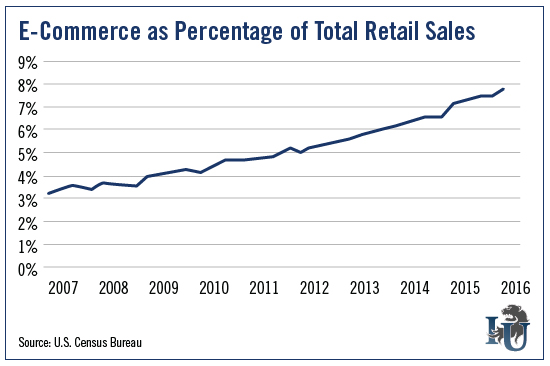Millennials...the generation everyone loves to hate.
They’re too entitled, too lazy and they spend entirely too much time on their phones.
But the criticism is nothing new. It’s a rite of passage. My generation -- Gen-X -- was widely slammed. And the Baby Boomers before us were disliked by the generations before them.
But despite all of the negativity, there’s no denying that Millennials have drastically changed the way businesses operate.
And now every other generation is mimicking their habits.
As the first to grow up in the truly digital world, Millennials are much quicker to accept and adopt technology. This has greatly impacted a number of sectors, but none more than retail.
Mall traffic is in decline for the first time since the Great Recession. Same-store tenant sales are expected to grow a paltry 1.2% from 2016 to 2019.
And it’s largely due to the fact that Millennials prefer to shop online.
Yes, Millennials are killing malls. But online sales are surging.
I’ve been covering e-commerce for years. Online shopping is a massive trend that will only get bigger. In fact, this is actually just the beginning.
The Death Of Brick-And-Mortar
Web-based sales are still only a small portion of overall retail sales. Year over year, U.S. e-commerce sales increased 15% in the first quarter -- to $92.8 billion.
That may seem like a lot, but it accounts for less than 8% of total retail sales ($1.18 trillion).
What gets me excited, though, is the rate of growth here. Since the first quarter of 2007, e-commerce sales have grown 192%.
At the same time, the percentage of sales made online, as it relates to total retail sales, has increased from 3.2% to 7.8%.
That growth is exponential as every other generation follows the Millennials’ fierce charge. Older groups are starting to make more and more purchases online and through mobile devices.
And that is what’s killing brick-and-mortars.
To demonstrate how much this segment has grown, let’s consider that first quarter e-commerce sales number of $92.8 billion.
For all of 2007, total e-commerce sales amounted to $136.03 billion.
But it’s important to note that this shift is not killing the broad retail sector. The opposite is true.
Retail sales are expected to grow 20% over the next four years. Six years ago, expectations for growth were at less than 10%.
So, thank Millennials.
A New Tidal Wave Of Buyers
Older Millennials -- between the ages of 25 and 34 -- are the most dependent on e-commerce. This group spends the majority of their clothing budgets online. But there’s a new wave of buyers on the horizon.
Research shows that Gen-Xers lag Millennials in adoption of e-commerce by one year. Baby Boomers lag behind by two years or more.At the moment, 35% of older Millennials buy the majority of their clothing online. The number is 30% for Generation-X and 19% for Baby Boomers.
But all of these figures are increasing.
Going forward, the biggest inroads to be made are in mobile retail, or “m-commerce”. Here, 63% of Millennials have made purchases with their smartphone. To compare, only 41% of Gen-Xers have done this followed by just 19% of Baby Boomers.
And if we look back to the 2015 holiday season, we see something truly amazing.
Online retailers reported 31 days when they brought in $1 billion or more in sales. Every single one of those days fell between November 22 and December 22.
That holiday season represented 28% of total online sales last year. But the biggest winner was mobile. Retail sales from smartphones increased 52% during this period to $14 billion.
Consumers of all age groups are becoming more comfortable with making purchases with their phones.
It’s still a small segment compared to total retail sales, but, again, we’re focusing on growth.
To me, it’s no surprise that Millennial shopping habits are extending to older generations. Over the past year or so, I’ve become a big fan of “show-rooming.” That’s finding something you like in-store, but immediately pulling out your phone and checking prices online.
More often than not, you can get a better deal via the company’s own website or a competitor.
My only issue with shopping this way is that I didn’t think of it sooner.
Millennials led the charge into Facebook (NASDAQ:FB), Twitter (NYSE:TWTR) and Snapchat. (Today, these are all multibillion-dollar businesses.) Now they’re leading the charge into online and mobile retail.
In the not-so-distant future, e-commerce and m-commerce sales will outpace total retail sales.
It’s not a matter of if, but when.
You’re going to want to dedicate a chunk of your portfolio to retailers that understand and cater to these habits. Make sure they’re focused on the “three Cs”: connectivity, content and community.
And try not to be too rough on Millennials. They may be killing malls, but they’re saving retail in the process.
Good investing

